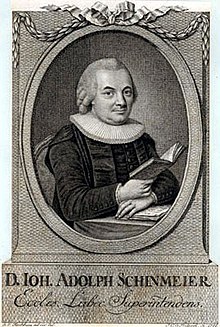Johann Adolph Schinmeier
Johann Adolph Schinmeier (also: Schinmeyer , born March 29, 1733 in Stettin ; † May 2, 1796 in Lübeck ) was a German theologian, orientalist and last superintendent of the city of Lübeck in the Age of Enlightenment and a representative of the Enlightenment ideas .
Life
Schinmeier was the son of Johann Christoph Schinmeier, who was pastor at St. Johannis in Stettin at the time of Johann Adolph's birth and later became an inspector (superintendent) in Rathenow . He died as Superintendent von Tönning in 1767. His mother was Amalie Emerentia Lieberkühn, the sister of Johann Nathanael Lieberkühn .
Johann Adolph first attended school in Berge monastery near Magdeburg and then studied theology at the University of Halle . In 1757 the aristocratic women's monastery in Itzehoe elected him deacon at the town church of St. Laurentii (Itzehoe) . After a trip to his native city of Stettin, he was appointed archdeacon at the Marienkirche in Stettin in 1764 and at the same time professor of theology and oriental studies at the Marienstiftsgymnasium . Here he also held the office of rector in 1772/73. In 1767 he was appointed consistorial councilor, and in 1771 the University of Kiel earned him a doctorate in theology.
From 1774 he worked in Stockholm as pastor of the German St. Gertruds Church and inspector of the German school. Shortly before his planned appointment as general superintendent for Swedish Pomerania by King Gustav III. he received the call to Lübeck, which he accepted.
In 1779, after a five-year vacancy, he succeeded Johann Andreas Cramer as superintendent of the Lübeck Church, which was connected with a preaching position at the Marienkirche .
Act
Schinmeier developed from a pietist to a staunch advocate of the Enlightenment and rationalism and a celebrated preacher of the Enlightenment , who understood his office primarily as that of a teacher. In 1790 he was in charge of the new edition of the Lübeck hymn book, which replaced the one from 1703 and was entirely committed to the spirit of the Enlightenment. At the same time, the number of public holidays was reduced from 19 to 12, the vestments still in use in St. Mary's Church were abolished and the liturgy was radically simplified.
Schinmeier was a Freemason and in 1785 joined the Hamburg Obermeisterei Israel , a north German branch of the Asian Brothers . In 1789 he was one of the 25 founding members of the Society for the Promotion of Charitable Activities .
After Schinmeier's death, the office of superintendent in Lübeck, which had sometimes been vacant for years before, expired because the council did not appoint a successor. From now on, the spiritual supervisory duties were carried out by the senior of the ministry in Lübeck, who, unlike the superintendent, was not a counterpart to the council until 1870, but had to limit himself to internal tasks.
Works (selection)
- Sermons about the divine calming of Christianity. Flensburg and Leipzig: Korte 1773
- Sermons about the character of Jesus in his life and sufferings. 2 volumes, Korte, Flensburg 1774–1776
- Attempt of a complete history of the Swedish Bible translations and editions with display and assessment of their value: In addition to an appendix of some rare manuscripts and the living conditions of the most remarkable people interested in them. 4 volumes, Korten, Flensburg 1777–1782
- Biographies of the three Swedish reformers, Chancellor Lorenz Anderson, Oluf Peterson, Lorenz Peterson: as a contribution to the history of the Swedish Reformation and Bible translation. Christian Gottfried Donatius, Lübeck 1783
- Sermons on the catechism of Luther. 2 volumes, Donat, Lübeck 1787–1789
literature
- Johann Georg Meusel : Lexicon of the German writers who died from 1750 to 1800. Volume 12, pp. 166-170 digitized
- Gottfried von Bülow : Schinmeyer, Johann Adolf . In: Allgemeine Deutsche Biographie (ADB). Volume 31, Duncker & Humblot, Leipzig 1890, p. 302 f.
- Wolf-Dieter Hauschild: Church history of Lübeck. Christianity and the bourgeoisie in nine centuries . Lübeck 1981, p. 359ff.
Web links
| predecessor | Office | successor |
|---|---|---|
| Johann Andreas Cramer |
Superintendent of the Lübeck Church 1779 - 1796 |
(the office was not filled again) |
| personal data | |
|---|---|
| SURNAME | Schinmeier, Johann Adolph |
| ALTERNATIVE NAMES | Schinmeyer, Johann Adolf |
| BRIEF DESCRIPTION | German theologian |
| DATE OF BIRTH | March 29, 1733 |
| PLACE OF BIRTH | Szczecin |
| DATE OF DEATH | May 2, 1796 |
| Place of death | Lübeck |
